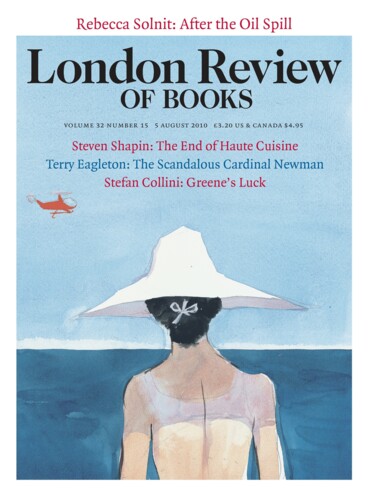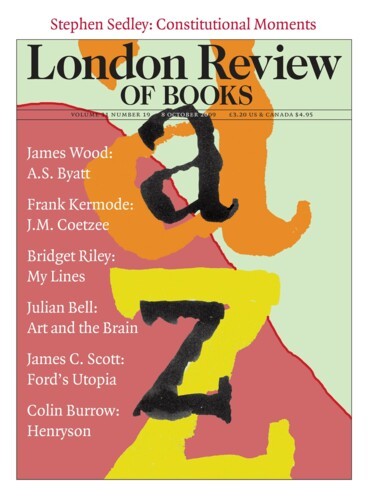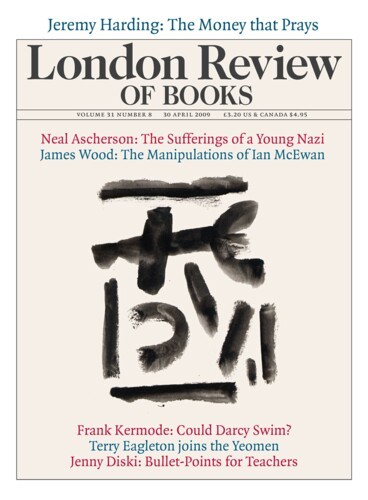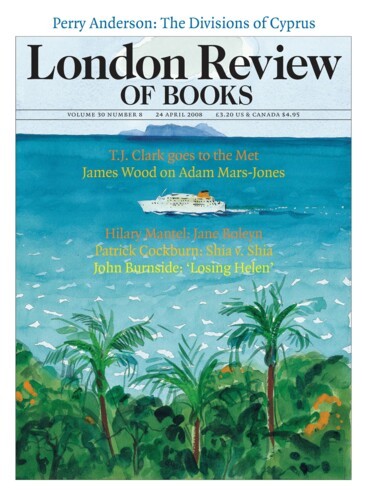James Wood
James Wood is professor of the practice of literary criticism at Harvard and a staff writer at the New Yorker. His books include The Broken Estate, The Irresponsible Self, How Fiction Works and, most recently, Serious Noticing: Selected Essays 1999-2019.
In a Spa Town: ‘A Hero of Our Time’
James Wood, 11 February 2010
When Samuel Johnson, travelling in the Highlands with James Boswell, reaches Loch Ness, he is so overwhelmed by the massiveness of the landscape that the heavy order of his prose is briefly disarrayed. On his right, there are high and steep rocks, and on his left deep water laps against the bank in ‘gentle agitation’. The rocks are ‘towering in horrid nakedness’....
Bristling with Diligence: A.S. Byatt
James Wood, 8 October 2009
Whenever a detail could be selected at the expense of another one, Byatt will always prefer to buy both, and include the receipts: ‘Art Nouveau, the New Art, was paradoxically backward-looking, flirting with the Ancient of Days, the Sphinx, the Chimera, Venus under the Tannenberg, Persian peacocks, melusines and Rhine maidens’. There is always an atmosphere of the author reporting for intellectual duty, bristling with diligence. Her fictional world is exhaustively searched, but never quite seen. Some large novels are remarkably lithe, but The Children’s Book is rhythmically stolid.
James Wood writes about the manipulations of Ian McEwan
James Wood, 30 April 2009
At a formal level, the confession of any withheld revelation, even an unsettling one, is satisfying. It contains and closes; it solves a narrative puzzle. This manipulation of surprise is reproduced at the level of McEwan's sentences. He writes very distinguished prose, but is fond of a kind of thrillerish defamiliarisation, in which he lulls the reader into thinking one thing while preparing something else.
Nothing in a Really Big Way: Adam Mars-Jones
James Wood, 24 April 2008
Like Welch’s work, Pilcrow gets nowhere very elegantly. Adam Mars-Jones has been celebrated for the slenderness of his work, increasingly for its non-existence, as if his career were an exercise in negative theology. Pilcrow is not only very long; it measures its length in such tiny units that at times you feel that a version of Zeno’s paradox will stop you from ever reaching its end.
Podcasts & Videos
Bom, Bom, Bom, Bom
James Wood and Thomas Jones
James Wood talks to Thomas Jones about Beethoven.
On Not Going Home
James Wood
James Wood delivers his lecture on the estrangement of voluntary emigration: the puzzling sense of losing the country you leave and failing to find another. Homelessness, in a word.
Diary: These Etonians
James Wood
James Wood reads his piece recalling his time at Eton College with Messrs Cameron, Johnson, Rees-Mogg and others.
James Wood reads from his collection of essays The Fun Stuff, and fields questions from the audience.
Read anywhere with the London Review of Books app, available now from the App Store for Apple devices, Google Play for Android devices and Amazon for your Kindle Fire.
Sign up to our newsletter
For highlights from the latest issue, our archive and the blog, as well as news, events and exclusive promotions.





